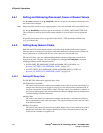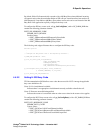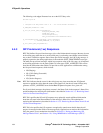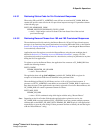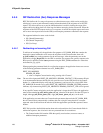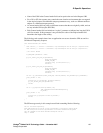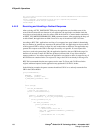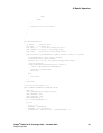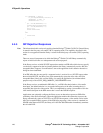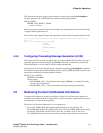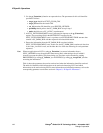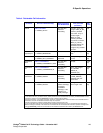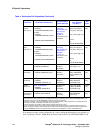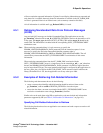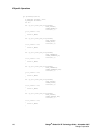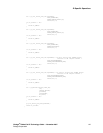140 Dialogic
®
Global Call IP Technology Guide — November 2007
Dialogic Corporation
IP-Specific Operations
if ( HeaderName != NULL &&
0==_stricmp(HeaderName,"contact") &&
(HeaderData != NULL) &&
(HeaderDataSize != 0) )
{
ptr = strchr(HeaderData,'<');
redirectURI=ptr+sizeof(char);
ptr = strchr(HeaderData,'>');
ptr[0]='\0';
return redirectURI;
}
else
{
return NULL;
}
}
4.4.5 SIP Rejection Responses
Note: The information in this section only applies when the Dialogic
®
Global Call IP Call Control library
is started in the first party call control (1PCC) operating mode. The capability described in this
section is not supported when the library is started in the third party call control (3PCC) operating
mode.
There are several circumstances in which the Dialogic
®
Global Call API library automatically
rejects an initial call offer or a subsequent media session proposal.
If the library receives an initial INVITE request that contains an SDP offer which does not specify
a codec that is supported on the local media platform, the library automatically sends a 488 (Not
Acceptable Here) response. No notification is sent to the application in this situation because no
dialog has been established.
If an SDP offer that does not specify a supported codec is received in a re-INVITE request rather
than an initial INVITE, the library once again automatically rejects the offer with a 488 (Not
Acceptable Here). But in this case the library does notify the application (form informational
purposes only) with a GCEV_REQ_MODIFY_UNSUPPORTED event.
If the library receives an multimedia SDP offer (i.e., an SDP offer that includes a video media
descriptor), the default behavior is to accept the audio portion of the offer (assuming that it is
acceptable) but reject the video portion. This is accomplished by setting a port number of 0 in the
video media descriptor in the SDP answer that is sent in the 200 OK response.
Applications can optionally configure the library to use an alternative response to SDP offers
containing video media descriptors. When the application enables this alternative response, the
library automatically rejects an INVITE or re-INVITE that requests a video media session with a
488 (Not Acceptable Here) response. If the SDP offer proposing a video session is contained in a
200 OK rather than an INVITE, the library will ACK the 200 OK but then immediately terminate
the call with BYE.



